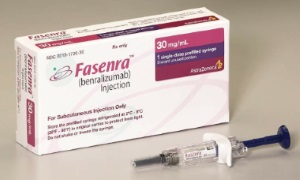AstraZeneca's Fasenra (ingredient: benralizumab) gained approval as an additional maintenance treatment for patients with severe eosinophilic asthma, from the Ministry of Food and Drug Safety on Wednesday.

Hospitals will be able to use Fasenra as an adjunct to conventional treatments if they do not adequately control symptoms. Patients receive the drug once every four weeks for the first three months, and once every eight weeks after that.
The ministry's nod came after the company proved the drug's efficacy through SIROCCO, a clinical trial conducted to demonstrate the effect of Fasenra on asthma exacerbation on 1,205 severe asthma patients worldwide.
The study, which included 122 Koreans, showed that the treatment reduced the annual asthma exacerbation rate by 45 percent in the once every four-week group and 51 percent in the once every eight-week group when compared with the placebo arm.
The company also confirmed similar results in its CALIMA study, where the annual asthma exacerbation rate compared to placebo was 36 percent lower in the once every four-week group and 28 percent lower in the once every eight-week group.
Both studies measured the change in baseline FEV1 (forced expiratory volume per second) and showed consistent improvement over placebo.
To evaluate the long-term safety and efficacy of Fasenra, the company conducted a 56-week extended follow-up study, also known as BORA, on 1,926 patients who participated in the SIROCCO and CALIMA study.
The results showed that the drug produced no significant safety difference when compared to the placebo group, while 72 percent of patients in the Fasenra group did not develop asthma exacerbations and maintained FEV1.
"A proper treatment for asthma is needed as it is a frequent disease worldwide, and the risk of hospitalization or death greatly increases when asthma exacerbates," said Jin Myeong, director of AstraZeneca's Korea respiratory business unit. "The company hopes that the new treatment will offer new treatment options for local patients who have trouble managing their asthma symptoms with existing treatments."
Fasenra is an anti-IL-5 agent that directly induces apoptosis by binding directly to the interleukin-5 receptor (IL-5Rα) expressed on the surface of eosinophils. It reduces the deterioration of asthma compared to placebo and improves lung function, Jin added.

